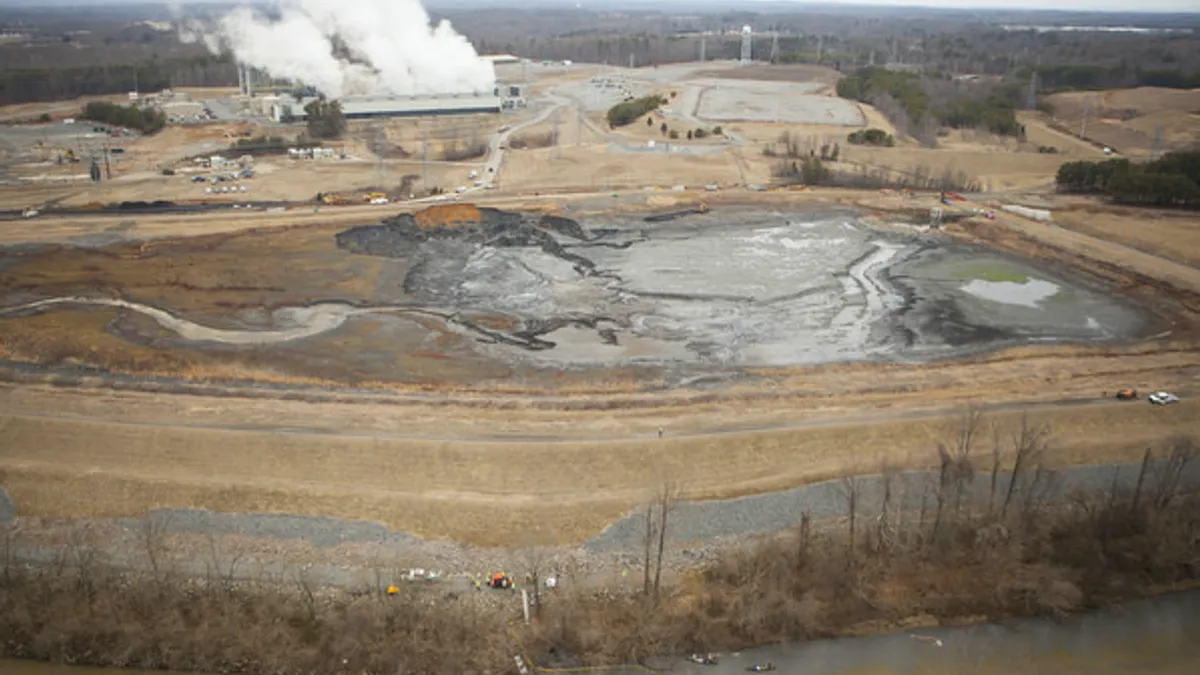Dive Brief:
-
Duke Energy has no plans to reach a compromise on whether it can recover the costs of its coal ash clean-up through its current rate case in North Carolina, the company's CEO Lynn Good said during its Q3 earnings call on Thursday.
-
The company is asking the North Carolina Utilities Commission (NCUC) for a 6% increase in its Duke Energy Carolinas territory and about 15.6% in its Duke Energy Progress territory to recover costs from its coal ash cleanup, among other things. Local clean energy and environmental groups have been staunchly opposed to the potential rate increase, which is being appealed in the state's Supreme Court by North Carolina Attorney General Josh Stein.
-
But in response to an analyst question about how the utility might pursue a settlement with such groups, Good indicated a compromise was not in the cards. "I do not expect that we will be reaching settlement on coal ash. I think all parties are interested in hearing what the court and commissions have to say," she said.
Dive Insight:
Duke's coal ash cleanup began with a settlement, but it won't end with one, according to Good.
The company in January reached a settlement agreement with environmental groups to excavate a total of 124 million tons of coal ash waste, considered the largest coal ash cleanup in the country. In total, the plan is expected to cost the utility up to $9 billion.
If the utility is not able to recover those costs, its balance sheet will be weakened, which would impact its cash flow or the affordability of its rates, according to analysts. In a separate case earlier this year, the NCUC ruled Dominion Energy could not earn a return on its coal ash cleanup investments, which analysts and the utility agree puts additional risk on Duke. But Good said she was confident in the NCUC's thinking on their current rate case.
"We believe that coal ash is a recoverable cost, the NCUC does as well," said Good on Thursday. "We also believe that we are entitled to earn a return on costs that are collected over a long period of time consistent with the precedence of rate making in the state, and also consistent with the requirements of strong credit for the utility. So we will await this [NCUC] ruling later this year."
But analysts have previously said the Supreme Court ruling would likely be more consequential than what regulators decide, since the Supreme Court could ultimately overturn the NCUC's ruling. The state's attorney general, along with the NCUC public staff and environmentalists in the state, argue that the utility knew it was polluting groundwater, and customers should not have to pay for coal ash costs.
"Duke Energy knew for many years that the way it handled coal ash was risky and could pollute groundwater, but it failed to act prudently when it should have. And now, Duke argues that the people of North Carolina should pay the full cost of cleaning up coal ash," said Stein in a statement announcing the appeal. "I disagree with the Utilities Commission’s decision and am challenging it in the North Carolina Supreme Court because I believe that Duke’s shareholders should have to pay their fair share of the total cost."
The utility reduced its earnings per share guidance range for 2021 as a result of the unknown coal ash risk to $5.05-$5.20, down from $5.05-$5.45. The utility expects to hear from the state Supreme Court and the NCUC by the end of the year. Good said despite the uncertainty surrounding coal ash and the cancellation of the Atlantic Coast Pipeline (ACP) earlier this year, the company is feeling optimistic about having greater certainty in 2021.
"As I look at 2021, there is so much clarity. We will have all of this behind us, the uncertainties that have been a challenge for us," she said. "And we're excited about the ability for the utilities to demonstrate the growth we know they're capable of, without ACP, without rate case overhang, without coal ash et cetera."
Despite a 4.1% drop in sales from Q3 last year to Q3 this year due to the pandemic and weather, the utility ultimately beat analysts' expectations for Q3 earnings, rising from $1.79 to $1.87 per share, year over year.














